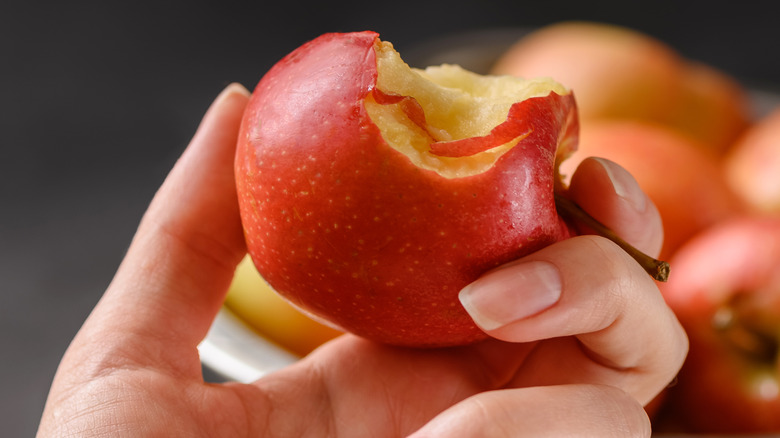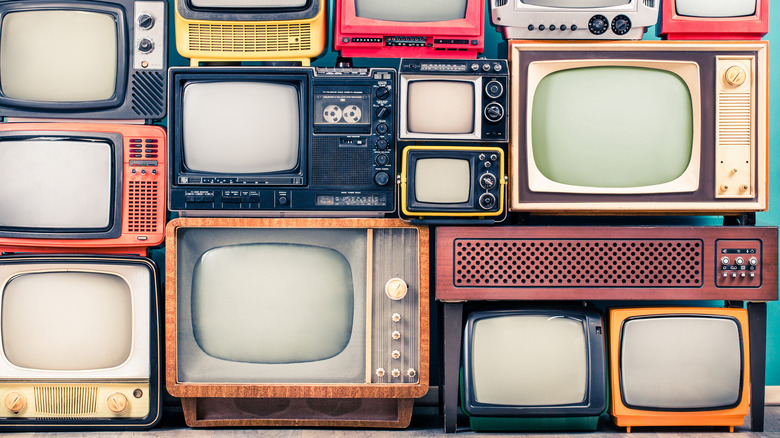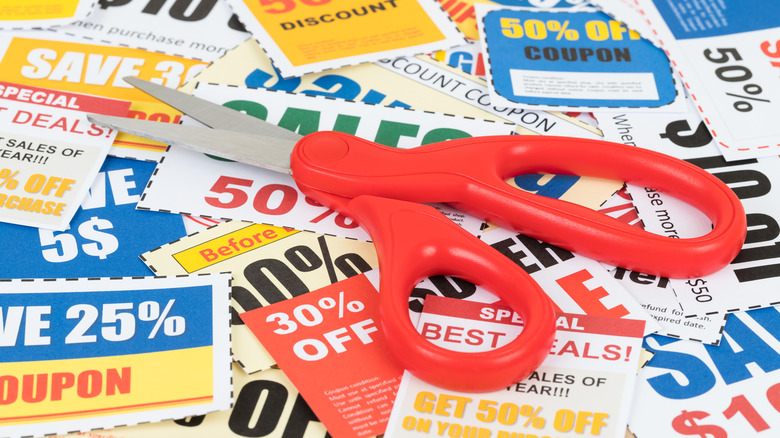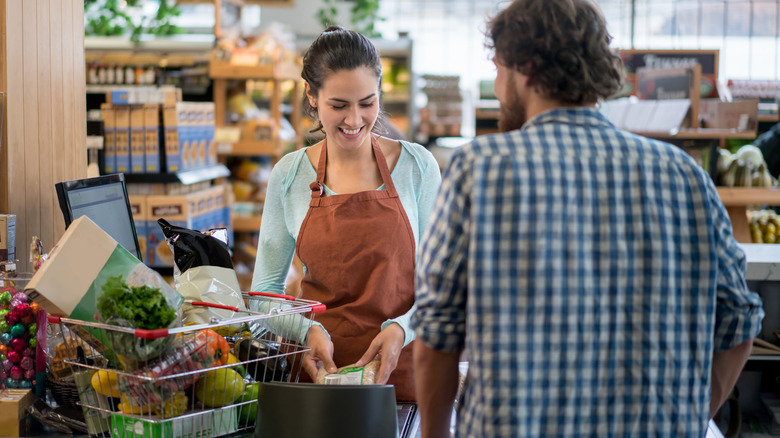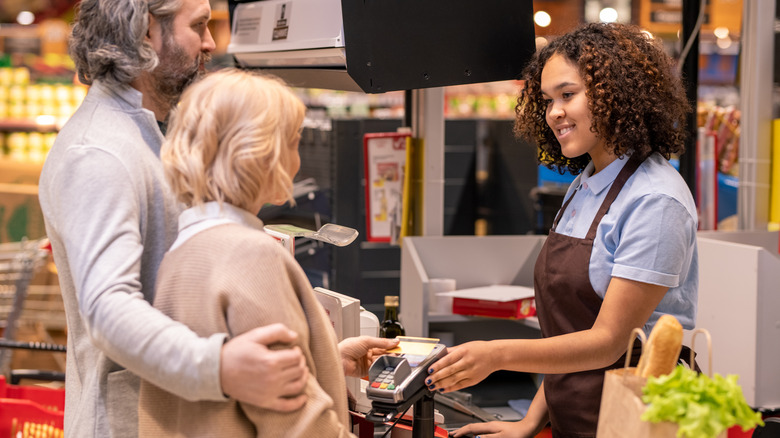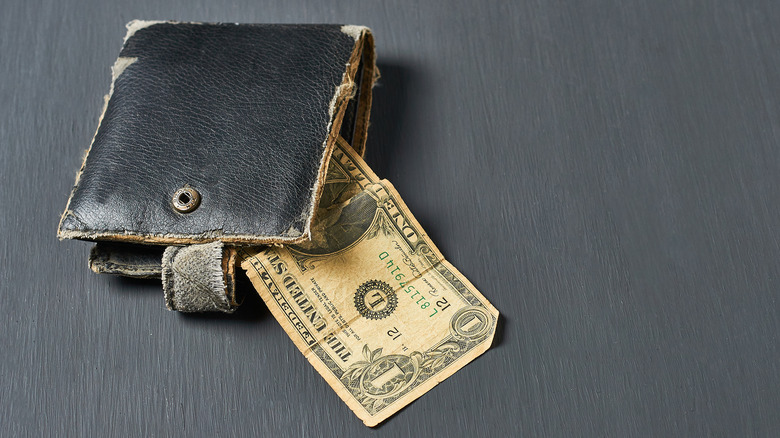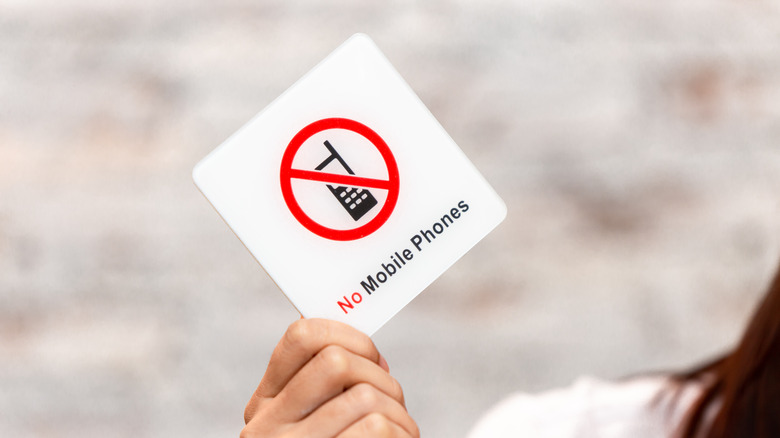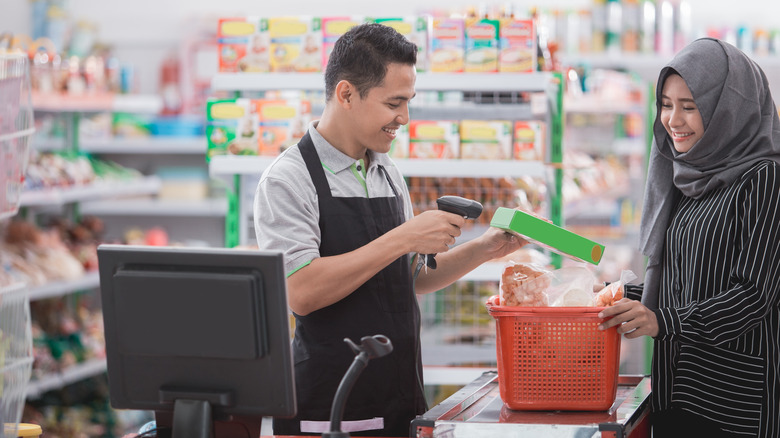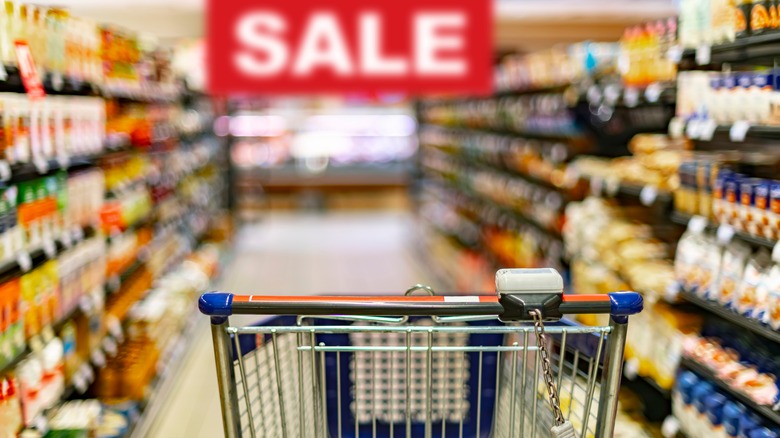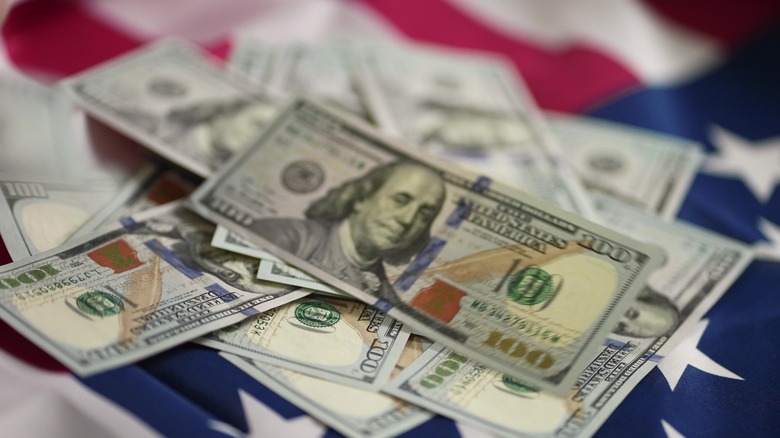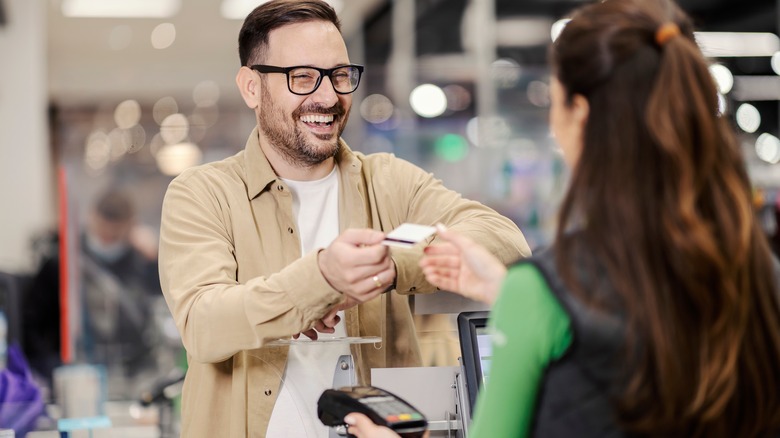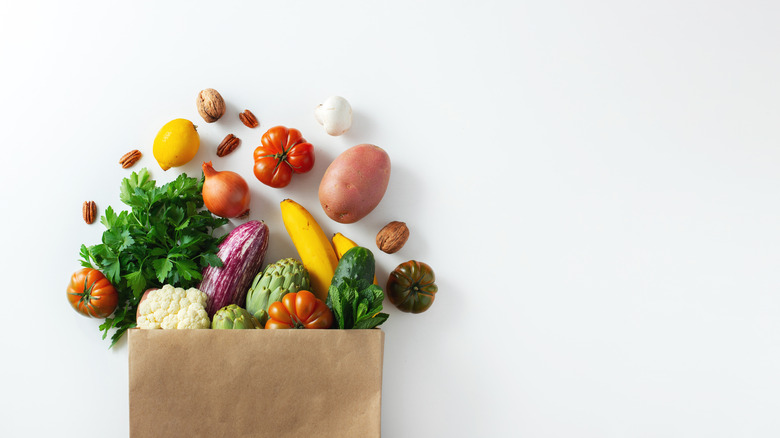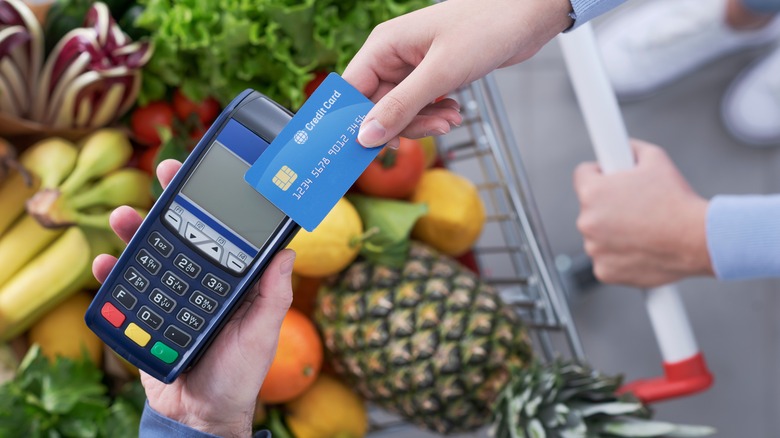Rude Things You Are Doing At The Grocery Store Checkout According To Employees
We get it: Not everyone loves grocery shopping. And, even if you're usually someone who loves browsing the aisles and checking out new products, there are days when you just want to get in and out as quickly as possible. However, it's important to remember that the cashiers ringing up your groceries are humans too, and they deserve your courtesy and respect.
Unfortunately, some customers can be inconsiderate — and others can be downright rude. It's not easy working in retail, so it's important to listen to grocery store employees about what behaviors are rude and annoying. That way, you can be a better customer and end up as the favorite of all the cashiers and other workers at your local grocery store. We've got the inside intel on all the rude things you're doing at the grocery store checkout, according to employees, and it's time to stop doing them.
Anyone who's ever worked with the general public knows that the old adage "the customer is always right" is far from true. So, it's worth examining your behavior to make sure you aren't part of the problem. Let's take a look at some of the things you might be doing at the grocery store checkout that employees find particularly bothersome.
Bringing items to the checkout that you've already eaten or opened
It may seem obvious that you shouldn't do it, but some customers bring partially consumed or opened items to the checkout counter. This causes inconvenience for the cashier, who has to figure out what to do with the item, which is a particular issue if it's partly consumed and messy.
Insider spoke to grocery store employee Albert Navarret, who said, "Don't open things before you buy them. This is just rude. Even if you plan to buy it, the item isn't yours yet. Most supermarkets have strong policies about this, and you may be approached by a staff member."
Sure, you might be hungry or thirsty while you're doing your grocery shopping, but unless you have a health condition that means you need food or drink right away, just wait until you're done shopping. If you really can't wait for sustenance or you have kids who are bugging you for a snack, go to the checkout and pay for the items you want to eat, then carry on with the rest of your shop.
Revealing TV spoilers or sports scores
Many cashiers work evening shifts and weekends and might not be able to watch their favorite show or a significant sporting event while it's happening. Instead, they might record it or rely on catchup TV to watch it later. So, when you come in talking about what happened in last night's episode of a popular TV show or revealing the score of the big game, it adds insult to injury.
You might think you're being friendly and making small talk, but stay away from spoilers and sports scores. Even if you aren't talking directly to the cashier, bear in mind that they might be able to hear you even when you're talking to someone else in line. So, sharing spoilers or discussing game results loudly in the checkout line is a big no. You might just ruin the experience for the hardworking grocery store employee ringing up your goods, not to mention others around you who haven't had a chance to watch yet.
Blaming cashiers for expired coupons
We've all been there — excitedly presenting our carefully clipped coupons at the grocery store checkout only to be met with the dreaded response, "I'm sorry, but this coupon has expired." Frustration kicks in, and some customers instinctively look for someone to blame. Unfortunately, all too often, cashiers become the unsuspecting targets of this misplaced anger. But blaming cashiers for expired coupons is simply unfair.
Remember, cashiers aren't the architects of coupon expiration dates. They're employees tasked with implementing store policies and procedures — and just trying to get through the day. Coupon expiration dates are determined by the manufacturer or the company offering the discount, not the cashier. So, directing your frustration toward the cashier accomplishes nothing but spreading negativity.
In many cases, cashiers aren't given the authority to override expired coupons on a whim. Cashiers are trained to follow store policies. Blaming them for following these guidelines is like shooting the messenger — it's misplaced and unproductive.
Instead of blaming the cashier, you should take personal responsibility for keeping track of coupon expiration dates. If it helps, you can organize them by date or category, making it easier to identify which ones are still usable. By taking this proactive approach, you minimize the chances of disappointment at the checkout counter and contribute to a smoother shopping experience for yourself and those around you.
Not removing items from your basket
You're standing in line at the grocery store checkout, patiently waiting your turn. As the line inches forward, you notice something that can instantly dampen the shopping experience — someone approaching the cashier with their items still inside the basket. It may seem like a small act, but leaving items inside the basket at the checkout is more than just an innocent oversight, it's rude.
Unloading your items from the basket shows respect for the cashier's time and effort. Cashiers are there to efficiently scan and bag your groceries, ensuring a smooth checkout experience. When you leave items inside the basket, you're essentially expecting the cashier to do the extra work of unloading the items for you. This not only slows down the process but also puts an unnecessary burden on the cashier, who has other customers to attend to. By taking a moment to unload your items, you contribute to a more efficient and considerate checkout process.
You shouldn't overlook the impact on other customers, either. Leaving items in the basket can create delays for those waiting in line behind you. It takes extra time for the cashier to navigate through the basket, scan each item, and bag them properly. This slows down the entire checkout process, causing frustration and inconvenience for those in line. By promptly unloading your items, you contribute to a more efficient flow, allowing everyone to complete their transactions in a timely manner.
Making inappropriate conversation
Picture this: You're waiting in line at the grocery store, eagerly unloading your cart onto the conveyor belt. The cashier smiles politely and begins scanning your items. In that moment, it's crucial to remember that they're there to do their job. The last thing they want is to engage in inappropriate or uncomfortable conversations.
Yes, we're talking about those cringe-worthy moments when customers delve into politics or ask personal questions. It's time to ditch the awkwardness and understand why inappropriate conversations at the grocery store checkout just don't cut it.
Politics can be a passionate and engaging topic for many. But the checkout line of a grocery store is not the place to ignite a political debate. Cashiers are there to provide a service, not to be bombarded with your opinions. Engaging in political discussions in this setting creates an uncomfortable atmosphere for both the cashier and other customers in line. So, let's leave political discourse for appropriate platforms.
Personal questions can be equally invasive and uncomfortable. While you might be tempted to strike up a conversation and get to know your cashier on a more personal level, you should respect the boundaries of the cashier-customer relationship. Cashiers are professionals focused on completing your transaction. Probing into their personal lives, asking personal questions, or making unsolicited comments can be intrusive. Even if you mean well, not everyone wants to talk about their personal lives, and some questions may be offensive or upsetting.
Sorting out the contents of your wallet while there's a line behind you
We love organization as much as the next guy, but a grocery store checkout line is not the place to sort out the contents of your wallet. Maybe you've just realized that some of your cards are in the wrong place or your wallet is filled with old receipts, but put it away and deal with it later. Trust us, there are plenty of reasons why sorting your wallet at the checkout can wait, and it's all about check-out courtesy.
Not only are you holding up the line behind you, but you're also keeping the grocery store employee from doing their job. When you decide to sort out your wallet at the checkout, precious seconds turn into minutes. Meanwhile, the line behind you becomes a sea of sighs and shifting feet. Everyone just wants to get through the checkout process efficiently and get on with their day. By sorting your wallet at the checkout, you're inadvertently slowing down the entire process and inconveniencing everyone waiting in line.
Instead, plan ahead and be prepared. Take a moment before you reach the checkout to organize your wallet, ensuring that your preferred payment method is easily accessible. Consider utilizing a separate compartment or cardholder for frequently used cards or loyalty cards to expedite the process.
Talking on your phone while you're at the checkout
We live in a world that's constantly connected. Our phones have become extensions of ourselves, accompanying us everywhere we go. But there's one place where phone conversations should take a back seat — the grocery store checkout. It's time to put your phone down and pay attention.
When you engage in a phone conversation while checking out, you're essentially sending a message to the cashier and those around you that their time and service aren't a priority. It's not only disrespectful but also creates an awkward and impersonal transaction. Ignoring your cashier by talking on your phone sends the message that you don't care about their job or efforts.
Talking on the phone can also disrupt the checkout process. Conversations require your attention, and when you're engrossed in a call, you're more likely to miss important instructions from the cashier or make errors during the transaction. This not only slows down the process but also leads to potential mistakes that can cause inconvenience for both you and the cashier.
Let's not forget about those waiting in line behind you. When you talk on your phone, you inadvertently create a bottleneck, delaying the progress of the checkout line. People are left waiting, growing more frustrated by the second. Other shoppers also have places to be and tasks to complete. By prioritizing your phone call over the checkout process, you're disrupting the flow and creating unnecessary delays.
Placing heavy items on the conveyor belt
While it may seem convenient to let the belt do the heavy lifting, it's time to reconsider. Placing heavy items on the grocery store conveyor belt not only creates headaches for everyone involved but also poses potential risks.
Don't forget that when you put heavy items onto the belt, the cashier has to handle them. It might seem okay for you, but you're only lifting one item, while grocery store employees might work a register for 8 to 10 hours a day. When they have to deal with lifting many heavy items over the course of their shift, it's a recipe for back problems and muscle strains.
So, what's the alternative? Cashiers are equipped with handheld scanners, letting them scan items directly from the cart or basket. So, you can simply leave heavy items in the cart instead of moving them onto the belt. It's a win-win solution that ensures a seamless checkout process while reducing the potential risks associated with heavy lifting, both for you and the cashier.
Blaming employees if an item doesn't ring up the same price as the sale sign
You stroll into your local grocery store, lured by the enticing sale signs. You carefully select a product, only to find out at the register that it doesn't ring up at the advertised price. You're annoyed and it's natural to seek someone to hold accountable. But pointing fingers at the hardworking employees who are the face of the store is unfair.
Prices are constantly changing due to sales, promotions, and supplier costs. These fluctuations can result in a disconnect between the advertised price and the one at the register. Employees are often at the mercy of these ever-changing variables, making it unfair to hold them solely responsible.
One common culprit in the price mismatch saga is inaccurate or outdated signage. While grocery stores strive to maintain accurate pricing information, occasional mistakes do happen. Signs can be missed during updates, or new prices may not be immediately reflected in the system. The employees who discover these inconsistencies work to address them promptly, but the occasional oversight is inevitable in the fast-paced world of retail.
Rather than blaming employees for price discrepancies, it's more productive to engage in open communication with them. Sharing your concern politely and respectfully allows employees to address the issue promptly. Most grocery store employees genuinely want to assist customers. By working together, customers and employees can help identify and rectify pricing errors, contributing to an overall positive shopping experience for everyone.
Putting your cash on the counter when the cashier is holding their hand
Those of us who still pay with cash at the grocery store should be mindful of how we give it to the cashier. If a grocery store employee holds their hand out to receive the cash you're about to give them, putting it down on the counter makes you look like a grade-A jackass. They're a human being and spurning their outstretched hand is beyond rude. If you don't want human contact, you should use a self-service checkout or at least use cards over cash.
Of course, you should also respect the cashier if they would rather have the cash you give them placed on the counter instead of in their hand. They deal with hundreds of transactions a day and are more susceptible to picking up colds, flu, and other bugs going around, so it's more understandable if they want to minimize contact. It's all about respect, so simply being conscious that you're dealing with a person with their own thoughts and feelings goes a long way to avoiding being rude.
Joking that items that don't ring up must be free
A little lighthearted banter with grocery store employees can be welcome and make a long shift go faster. But, there's one tired joke that has worn out its welcome: the quip that items not ringing up must be free. It's time to throw this stale punchline out with the trash for good.
Humor can lighten the mood and make mundane tasks more enjoyable, but this joke has reached its expiration date at the grocery store checkout. Cashiers have heard it countless times, and its novelty has long since faded. It's time to embrace new and refreshing humor that can truly brighten someone's day, rather than relying on worn-out jokes that induce nothing more than an obligatory chuckle.
While it might be a stretch to call it rude, many grocery store cashiers find it repetitive and annoying. Cashiers work long hours, serving a constant stream of customers, and dealing with repetitive jokes soon becomes tiresome. By avoiding the "must be free" joke, we show respect for the cashier's experience and contribute to a more positive interaction at the checkout.
What's more, joking about items being free can create confusion and inconvenience. Grocery store clerks have a job to do, which includes ensuring accurate pricing and resolving any discrepancies. Making light of an item not ringing up can complicate matters and potentially slow down the resolution process. So, instead, dig deep into your repertoire for some fresh jokes, or keep quiet.
Mixing different types of produce in a single bag
You're standing in the produce section of the grocery store, trying to decide which fruits and vegetables to pick. As you gather your selections, it can be tempting to toss them all together in a single bag. But here's the truth: Mixing different types of produce in a single bag isn't just a matter of preference — it's a checkout faux pas that employees are sick of.
When produce is mixed together, it becomes challenging to identify and retrieve specific items at the checkout counter. Cashiers rely on efficient scanning and weighing of items to ensure accurate pricing. When produce is all jumbled together, it takes longer for the cashier to identify and separate each type, leading to delays and potential errors. By keeping produce separate, we streamline the checkout process, making it easier for the cashier to scan and bag items quickly and accurately.
By mixing different types of produce in the same bag, you're effectively asking employees to do extra work for you, so next time you're at the store, bag everything individually.
Showing up at the express lane with way too many items
Another behavior that grocery store workers are totally sick of is people showing up at the express lane with too many items. It might be tempting to take advantage of the shorter, faster-moving line at the express checkout, but if you're over the limit, you should head to another register.
Express lanes exist to accommodate those with just a few items in hand. But every now and then, someone decides to push the boundaries. When someone disregards this guideline and shows up with a cart full of items, it disrupts the intended efficiency of the express lane and inconveniences others who are abiding by the rules.
It's frustrating for the cashier, who is there to facilitate quick transactions and assist those with only a handful of items. When someone arrives with a shopping cart overflowing with groceries, it puts undue pressure on them.

